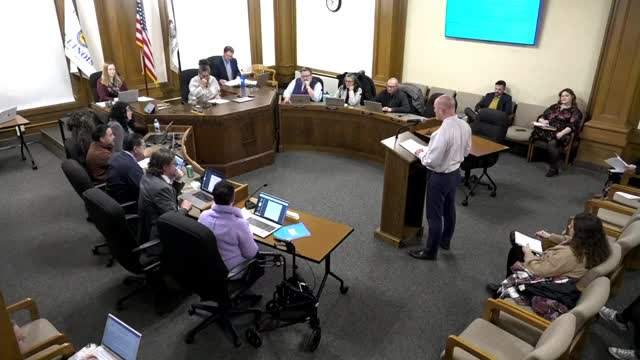Moline council updates sign and zoning code, cuts several parking minimums
Get AI-powered insights, summaries, and transcripts
Subscribe
Summary
The Moline City Council unanimously approved text amendments to the city's sign and zoning code that clarify sign illumination rules, add permitted exterior materials for commercial facades and reduce or eliminate several off-street parking minimums after a series of amendments.
The Moline City Council on Jan. 7 approved a broad update to Chapter 3 (Signs) and Chapter 35 (Zoning and Land Development) of the Moline Code of Ordinances, including new limits on sign illumination, expanded allowed building materials on commercial facades and reduced parking requirements for many uses.
The ordinance, presented to the committee of the whole as an annual code cleanup and update, drew the most debate on changes to minimum off-street parking requirements and on allowances for architectural metal and finished corrugated metal on commercial front facades.
City staff said the sign changes were intended to regulate very bright exterior illumination used on some storefronts, noting the existing language had inconsistencies. A staff presenter described the update as an effort to match enforcement language with the city's adopted integrated pest management policy and to correct typographical errors that had crept into the online code.
"The first one that you'll see come up is a change to the sign code and it is also going to include a change to our brightness standards," the staff presenter said, describing the intent to address extremely bright window lights at some businesses.
Council members pressed on multiple topics during the discussion: the permitted percent of architectural metal wall panels on a front facade, whether the code should allow more flexibility for stored recreational vehicles on residential lots, and lowering residential parking minimums.
A motion by Alderman Timmian (seconded by Alderman Schmidt) amended the ordinance to change the minimum required parking for manufactured homes and mobile-home parks to two spaces per unit. Staff said they had no objection to the amendment.
A separate, more consequential set of amendments removed minimum parking requirements for most commercial categories. Alderman Tammien moved to eliminate commercial parking minimums citywide; after debate and a subsidiary amendment proposed by Alderman Schmidt, the council narrowed that removal so it would not apply to lodging or the three entertainment categories (indoor, outdoor and adult entertainment). That amendment to the amendment passed 4-3; the subsequent vote to remove parking minimums for the remaining commercial categories passed 5-3. Council members supporting the change said removing minimums reduces barriers for small businesses and redevelopment of large, underused surface parking lots; members opposing or seeking caution cited the potential for spillover parking in neighborhoods and suggested more study for some use types.
Council also approved text allowing up to 35% of a commercial front façade to be architectural metal wall panels and adding finished corrugated metal and engineered wood to the list of permitted exterior materials (with existing prohibitions on vinyl, plain aluminum and unpainted steel reiterated).
After the sequence of amendments and votes, the council voted unanimously to adopt the ordinance as amended.
Why it matters: The reduced parking minimums and expanded material allowances change development expectations for new projects and for changes of use, particularly along commercial corridors and in areas with large surface parking. Several council members said the changes are meant to encourage redevelopment of malls and underused retail sites and to make smaller commercial infill projects more feasible.
The ordinance passed with multiple recorded floor amendments and the council instructed staff to continue outreach and pre-development coordination so applicants can avoid late-stage material or parking surprises.
What happens next: The ordinance takes effect according to the city's normal implementation schedule unless otherwise stated in the final ordinance language. Staff said variance and pre-development meetings remain available for projects that need exceptions.
